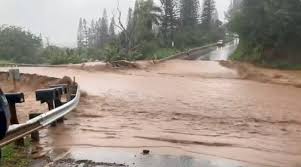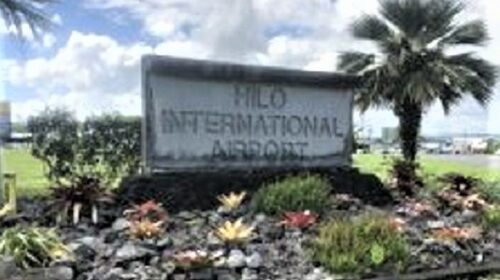Oahu should expect heavy rain and floodings
The National Weather Service informed the City and the Department of Emergency Management (DEM) Sunday morning that flooding and severe weather from a Kona Low system could begin impacting O‘ahu this evening with effects continuing through Tuesday. There is potential for O‘ahu to experience a catastrophic rain event during this period with intense rain bands. Deep tropical moisture could produce widespread 10 to 15 inches of rain with isolated areas of 20 to 25 inches with numerous road closures and property damage possible with numerous road closures and property damage possible.
In addition, strong southerly winds 20 to 35 mph with localized gusts to 50 mph possible tonight through Monday.
“We are closely tracking the storm and coordinating with the various city, state, and federal officials to help keep the public safe,” said Mayor Rick Blangiardi. “Because this storm has potential for significant flooding, high winds and thunderstorms we want people to be prepared and stay off the roads if possible during the storm conditions. We also urge people to stay informed and download the HNL Info app on their phone to receive important information and alerts.”
“We urge all residents and businesses to be prepared and to exercise an abundance of caution during this time. Be prepared, pay attention to your surroundings, and stay tuned to local news and official sources. Conditions could change quickly and it’s vital that you maintain situational awareness. We’ve had a tough year and, we ask that everyone help each other out as much as possible” said Hiro Toiya, director Department of Emergency Management (DEM).
City Services Update
Department of Emergency Management (DEM)
- DEM has initiated a partial activation of the City’s Emergency Operations Center (EOC) to coordinate City’s actions with state, federal, and non-governmental organization partners. The EOC is closely monitoring this severe weather event and are preparing to respond to support emergency and life safety operations on O‘ahu should the need arise.
Department of Environmental Services (ENV)
- ENV began clearing out all refuse Transfer Stations and Convenience Centers, in anticipation of the need to intake storm debris. For more information, locations and hours of operations see this link https://www.honolulu.gov/opala/quick-links/waste-drop-off-locations.html. General Solid Waste inquiries can be made to (808) 768-3200.
- Regular curbside refuse operations are planned for Monday and Tuesday. No special curbside collection of storm debris is planned at this point, but specific guidance will be provided should the need arise.
- Sewer maintenance crews will be working overnight Sunday, through Monday and likely overnight Monday into Tuesday, as conditions warrant, to deal with issues as they arise. Sewage spill issues can be reported to (808) 768-7272.
- All wastewater treatment plants will be staffed 24 hours beginning Sunday night. Sewer maintenance and treatment plant operations are checking and prepping equipment, including trucks, backup generators, ancillary pumps, etc.
What Should I do Before the Flood?
- Non-essential travel & activities. Consider curtailing all non-essential travel and activities until the flood emergency is over, including postponing visiting the Honolulu City Lights displays.
- Know your flood risk. Your home or business may be subject to flooding from even light rainfall, high tides, upstream debris or development, high surf, storms, hurricanes, tsunamis, dam failure, sea level rise, coastal erosion, or some combination of these hazards. Be aware of streams, drainage channels, roads, culverts, and other areas known to flood around your home or business.
- Gather emergency supplies and prepare your home. Store valuables in higher places. Clear drains and gutters. Keep important documents in a waterproof container. Consider creating password-protected digital copies (on a USB drive or uploaded to the cloud), as well.
- Plan how you will leave and where you will go if you are advised to evacuate.
- Check the weather forecast and flood alerts before hiking or outdoor activities. Hikers on O‘ahu have required rescues and have died from flash floods and landslides.
What Should I do During the Flood?
- Call 911 immediately if there is an emergency.
- Move to higher floors if trapped in a building. Go on the roof only if necessary. Once there, signal for help.
- Be aware of the risk of electrocution. Do not touch electrical equipment if it is wet or if you are standing in water. If it is safe to do so, turn off the electricity to prevent electric shock.
- Be prepared to evacuate and move immediately to higher ground.
- Stay informed by tuning into HNL Info, local radio stations, TV, WEA (Wireless Emergency Alerts), or official social media for current emergency information and instructions.
- Turn around, don’t drown! Do not attempt to walk, swim, or drive through flowing or rising water.
- Get out as soon as possible if your vehicle stalls in a flooded area. Floodwaters can rise rapidly and sweep away a vehicle and its occupants. However, stay inside your vehicle if you are trapped in rapidly moving water. If water is rising inside the vehicle, get on the roof.
- Use extreme caution when outdoors. A stream can flood within minutes. Do not cross streams until flooding completely subsides.
What Should I do After the Flood?
- Return home only after authorities say it is safe, if you evacuated.
- Avoid wading in floodwater, which may be hiding debris, contaminated with sewage, or electrically charged.
- Photograph flood damage for insurance purposes before cleaning up. Begin clean up immediately after taking photos, do not wait for a flood insurance adjuster or FEMA home inspector to come to your home.
- Wear heavy boots, gloves, and goggles during cleanup. Your home may be contaminated from overflowing cesspools, sewer, manholes, pesticides, animal fecal matter, dead animals, pathogens, chemicals, and associated debris.
- Thoroughly dry and clean or dispose of materials exposed to floodwater, including food, furniture, drywall, carpet and other flooring. Porous, absorbent materials that cannot be thoroughly cleaned and dried within 24-48 hours should be discarded. Residents with flood damage must separate rubbish, appliances and mud in areas on the street to be collected by the appropriate agency.
- Be aware of brown water advisories. Periods of heavy rain lead to increased runoff into pools of water and the ocean. Brown water advisories are issued by the Department of Health to remind the public to avoid dirty water as they may be contaminated.
- Prevent carbon monoxide (CO) poisoning. Use generators, pressure washers, or other gasoline-powered machinery outdoors at least 20 feet from doors, windows, or vents.




